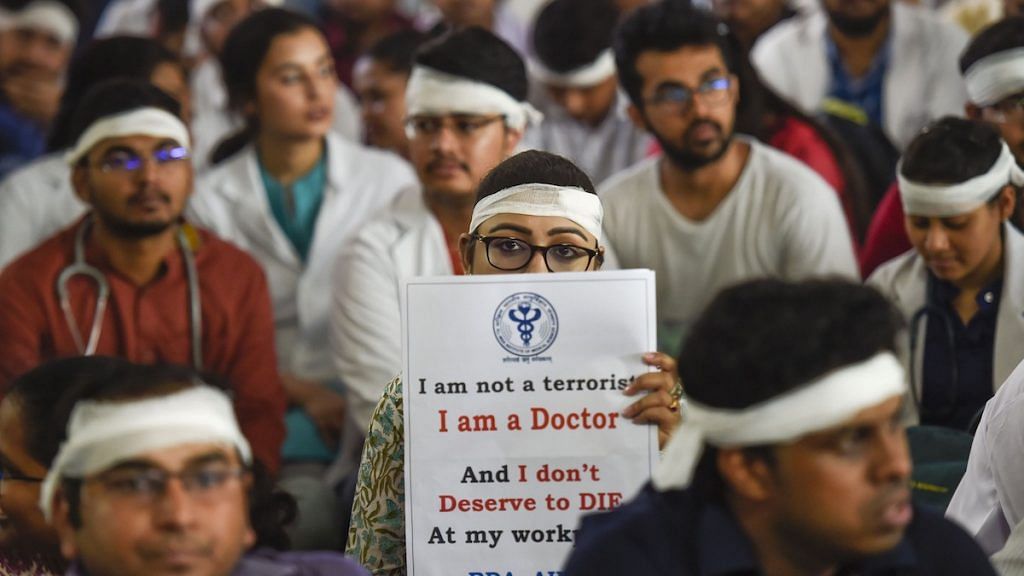As over 700 doctors resign and more go on strike in Mamata Banerjee’s West Bengal and other cities join in solidarity to protest patient attacks, I recall a conversation with a friend of mine who runs a small 100-bed hospital in one of India’s largest cities. Every now and then, his float glass façade is shattered. Without a frown, he replaces the same, with new float glass. Having seen this happen a few times, I asked him the silly question – why don’t you replace the glass with an iron grill? Wryly smiling he explained his crafty solution to a unique problem. Each time a patient died, the irate attendants would gather, encouraged by a local politician, and throw stones at his facade. The cathartic sound of shattering glass would douse all anger and with a sense of achievement, the bereaved patients leave and the hapless doctors heave a sigh of relief.
The vilification of doctors starts right at the top. Prime Minister Narendra Modi, in London last year, upset the entire doctor community by declaring that there is an unholy nexus between doctors and pharmaceutical majors. He went on to also state that doctors hoodwink anxious patients by selling them expensive stents. These comments by someone as senior as Modi further vitiated an atmosphere where doctors and not the corporate owners of tertiary care hospitals found themselves facing the music as irate patients across the country vented their fury on whoever they could see in front of them.
Also read:There is a law to protect doctors from assault but this is why it doesn’t work
The problem with both the health and the education sector in India is a deep asymmetry of information. While customers buying consumer goods know enough about products or have several alternatives to choose from, students and patients are clueless and must depend on the ethics and values of their providers of service. This asymmetry and stray examples of abuse of this power have led to a wide sweeping generalisation on the moral turpitude within the health sector.
The prime minister’s statement was adding fuel to the fire that had been burning since a highly publicised case of one major hospital charging Rs 16 lakh for a dengue patient who had died amidst claims of gross overbilling.
The strike by doctors in Kolkata that has now spread to many states brings up some very serious issues regarding the health sector in the country. The issue once again highlights the abysmal lack of clinical standards and a huge deficit in terms of human resources in state-run hospitals. The Clinical Establishments Act 2010 that was passed more than a decade ago has not been implemented in any state. Hospital associations have successfully ensured that the law is not implemented as according to them it is far too draconian, both by way of the penalties imposed and the price caps that it imposes. As a result, there is a widespread feeling that hospitals, particularly those run by corporate interests overcharge customers, even as they run on subsidised land made available by city planners and municipalities.
Doctors, on their part, complain that they are often underpaid even as they work round the clock given huge shortages of manpower, face angry customers and are abandoned by their owners and their management when things go sour. Unlike in other countries, our doctors are not covered by comprehensive insurance policies that protect them against legal action and against malpractice suits. Hospital managements complain that this kind of wanton vilification forces them to spend heavily on security, often hiring armed guards who must tackle mobs on a rampage. The police, which now runs an Omnipolis helpline in cities like Hyderabad, charges hospitals heavily for providing assistance during such emergencies.
Also read: Doctors blame staff shortage & poor infrastructure, not angry relatives for attacks on them
Nineteen states, including West Bengal, have passed the Protection Of Medicare Service Persons And Medicare Service Institutions (Prevention Of Violence And Damage To Property) Act that protects doctors. But enforcement is poor because the Act is not tagged to the Indian Penal Code (IPC) and the Code of Criminal Procedure (CrPC).
The situation is dire indeed. A much-quoted Lancet study shows that our doctor shortages are mind-boggling. There is much regional variation — there is one government hospital bed for every 614 people in Goa while there is only one for every 8,789 people in Bihar. Six out of 10 hospitals in our poor states do not provide intensive care and a fourth of them have abysmal sanitation and drainage facilities. The government’s flagship program Ayushman Bharat suffers from this gross undersupply of doctors even as it increases demand substantially. Till these concerns are addressed we will continue to have the kind of unfortunate flare-ups we are seeing in Kolkata.
The author is a professor of Health Economics at the MCRHRDI, formerly with the Gates Foundation.
